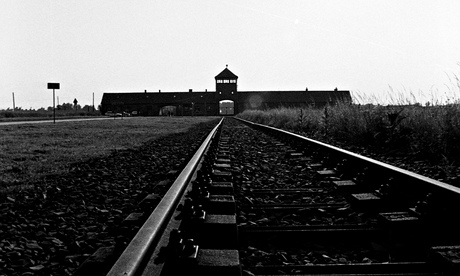
The epilogue of Martin Amis's memoir, Experience, charts the author's first visit to Auschwitz in the late 1990s. He had already written one novel about the Holocaust, the experimental Time's Arrow (1991), which approached the subject à rebours – working its way backwards through the rational madness of the death camps. Signing off Experience, a memoir which turns around two traumatic events – the death of his father and the murder of a beloved cousin by Fred West – with a trip to Auschwitz stressed the central importance of the genocide to Amis's worldview. In a recent interview, when asked about his enduring interest in the subject, he quoted WG Sebald: "No serious person ever thinks about anything else." It is somewhat surprising, then, that it has taken Amis well over two decades to return to the Shoah in fictional form (he has, of course, written widely on Stalin's death camps).
Amis was an early and vocal champion of Laurent Binet's magnificent HHhH, a piece of metafiction about the assassination of Reinhard Heydrich which calls into question the formal conventions of the historical novel. One book with which Binet takes particular issue is Jonathan Littell's wartime epic The Kindly Ones, narrated by a former SS officer. The Zone of Interest, far from another HHhH (or even another Time's Arrow) is a traditional, realist, historical novel that shares a great deal more with Littell than with Binet. It has few of the characteristics one would associate with Amis's work – little linguistic razzle-dazzle, few postmodern jeux; the humour is (mostly) restrained and subtle. It is a novel whose adventurousness is at the level of its ethical register, its attempt, in Zygmunt Bauman's words, to imagine the unimaginable.
The Zone of Interest of the title is Kat Zet, as the concentration camp in the novel is called (KZ being shorthand for Konzentrationslager). The events of the story unfold from three narrative standpoints – Angelus "Golo" Thomsen, the hero (his name cribbed from historian Golo Mann), Paul Doll, the commandant of the camp, and Szmul, head of the Sonderkommando (prisoners who were charged with disposing of bodies, "the crows of the charnel house").
Thomsen is the tall, decisively Aryan nephew of Martin Bormann, Hitler's private secretary, and has a vague and cushy role working for IG Farben, the industrial conglomerate whose executives employed slave labourers from the camps in their attempts to sustain the German war effort. This is a novel about Hannah Arendt's "banality of evil", about "the figures in business suits", as Amis describes them, "designers, engineers, administrators from IG Farben plants in Frankfurt, Leverkusen, Ludwigshafen, with leather-bound notebooks and retractable yellow measuring tapes, daintily picking their way past the bodies of the wounded, the unconscious, and the dead". It seeks to demonstrate, to quote Bauman again, how "bureaucracy is intrinsically capable of genocidal action".
The Zone of Interest is also a love story, showing Thomsen – "a great scragger of the womenfolk" – in his pursuit of Hannah Doll, the wife of the commandant, who, like all of the Nazis in the novel, is of imposing stature: "stolid, countrified, and built for procreation and physical work". Hannah is appalled by the work of her husband, by the malodorous evidence of his murderous activities that drifts over their house. Thomsen is equally disenchanted with the Nazi regime, telling Hannah in a letter: "When the future looks back on the National Socialists, it will find them as exotic and improbable as the prehistoric meat-eaters… They are not mammals. Mammals, with their warm blood and live young." The relationship between Thomsen and Hannah Doll is doomed from the start, the prospect of love impossible against the backdrop of the chimneys, the trains, the industrial horror of the camps.
I said earlier that the humour in the novel is restrained. More correctly, comedy is always directed towards the novel's ethical ends. As in the novels of Jirí Weil, Michel Tournier and Bohumil Hrabal, humour in The Zone of Interest seeks to show how farcical and bizarre the Nazi project was. As Amis puts it in Experience: "Auschwitz-Birkenau, where ideology becomes action, is like a formal dystopia dramatising the mind of the babbler, the monologuist, the man on the milk-crate with the flickering eyes." This crackpot is personified in the character of Paul Doll, who exists somewhere between his historical models – Rudolf Höss and Kurt Franz (whose nickname was "Doll") – and Amisian antiheroes from Keith Talent to Lionel Asbo. He is grotesque and bustling and corrupt and the sections in his voice are the novel's bravura performances, snippets of self-deluding ranting, drug-addled obsession.
For too long, Amis has felt like a writer impersonating himself. His last two novels, The Pregnant Widow and Lionel Asbo, led some to fear that his career was in terminal decline. The Zone of Interest is nothing like his great early novels, but it is the best thing he has written since London Fields. The book's postwar coda is enormously moving, the sections describing the "silent boys" of Chełmno almost unreadably sad, the figure of Szmul brilliantly rendered – at once admirable and horrifying in his desperate drive to survive. Facing the Medusa's head of Auschwitz has had a salutary effect on Amis's writing, the ethical rigours of the subject matter sloughing off the flippant and inessential. He has, yet again, been overlooked for the Man Booker prize, but this is a novel that will endure.

